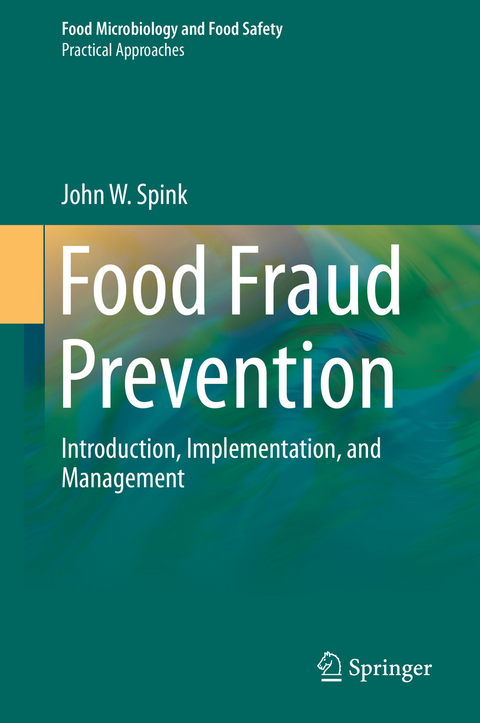
Food Fraud Prevention
Springer-Verlag New York Inc.
978-1-4939-9619-3 (ISBN)
There are now broad, harmonized, and thorough regulatory and standard certification requirements for the food manufacturers, suppliers, and retailers. These requirements create a need for a more focused and systematic approach to understanding the root cause, conducting vulnerability assessments, and organizing and implementing a Food Fraud Prevention Strategy. A major step in the harmonizing and sharing of best practices was the 2018 industry-wide standards and certification requirements in the Global Food Safety Initiative (GFSI) endorsed Food Safety Management Systems (e.g., BRC, FSSC, IFS, & SQF). Addressing food fraud is now NOT optional – requirements include implementing a Food Fraud Vulnerability Assessment and a Food Fraud Prevention Strategy for all types of fraud and for all products.
The overall prevention strategy presented in this book begins with the basic requirements and expands through the criminology root cause analysis to the final resource-allocation decision-making based on the COSO principle of Enterprise Risk Management/ ERM. The focus on the root cause expands from detection and catching bad guys to the application of foundational criminology concepts that reduce the overall vulnerability. The concepts are integrated into a fully integrated and inter-connected management system that utilizes the Food Fraud Prevention Cycle (FFPC) that starts with a pre-filter or Food Fraud Initial Screening (FFIS). This is a comprehensive and all-encompassing textbook that takes an interdisciplinary approach to the most basic and most challenging questions of how to start, what to do, how much is enough, and how to measure success.
The concepts in this book are based on the practical application experience and peer-reviewed journal publications of Dr. John Spink, who is the Director of the Food Fraud Initiative and an Assistant Professor in the Eli Broad College of Business at Michigan State University. His vulnerability-reducing research focus started in 2006 with intellectual property rights counterfeiting, and then expanded to all types of product fraud. In 2013 his focus shifted primarily to food fraud. He is the most widely published author regarding food fraud prevention, with fundamental works such as the 2011 “Defining the Public Health Threat of Food Fraud,” the 2013 “Defining the Types of Counterfeiters, Counterfeiting, and Offender Organizations,” the 2016 “Introducing the Food Fraud Initial Screening model (FFIS),” the 2019 “Introducing the Food Fraud Prevention Cycle (FFPC)” and the 2019 “Food Fraud Prevention: Overview and Requirements to Address ’How to Start?’ and ‘How Much is Enough?’” Hisleadership positions include product fraud related activities such as with “ISO 22000 Food Safety” and “TC292 Security Management/ Fraud Countermeasures,” GFSI Food Fraud Think Tank, and U.S. Pharmacopeia (USP). Global activities include engagements with the European Commission, INTERPOL and Operation Opson, Food Safety Authority of Ireland (FSAI), UK National Food Crime Unit (NFCU), New Zealand MPI, Codex Alimentarius, WHO/FAO, INFOSAN, the Codex Alimentarius Electronic Work Group on Food Fraud, Trinidad & Tobago Ministry of Agriculture, ISLI, AOAC, and served as an Advisor on Food Fraud to the Chinese National Center for Food Safety Risk Assessment (CFSA).
Chapter 1: Introduction (Part 1 of 2): Food Fraud Definitions and Scope.- Chapter 2: Introduction (Part 2 of 2): Basic Prevention Concepts.- Chapter 3: Food Fraud Prevention Overview (Part 1 of 3): Basics.- Chapter 4: Food Fraud Prevention Overview (Part 2 of 3): The Approach.- Chapter 5: Food Fraud Prevention Overview (Part 3 of 3): The Implementation.- Chapter 6: Business Decision Making and ERM/COSO.- Chapter 7: Criminology Theory (Part 1 of 2): Foundational Concepts.- Chapter 8: Criminology Theory (Part 2 of 2): Application Review.- Chapter 9: Supply Chain Management (Part 1 of 2): Fundamentals.-Chapter 10: Supply Chain Management (Part 2 of 2): Application Applied to Food Fraud Prevention.- Chapter 11:Standards & Certifications (Part 1 of 2): The Role of the Public Private Partnership.- Chapter 12: Standards & Certifications (Part 2 of 2): Global Food Safety Initiative (GFSI).- Chapter 13: International Public and Private Response.- Chapter 14: Marketing, Competitive Strategy,and Competitive Intelligence.- Chapter 15: Risk Analysis (Part 1 of 3): Basic Fundamentals.- Chapter 16: Risk Analysis (Part 2 of 3): Application to Food Fraud.- Chapter 17: Risk Analysis (Part 3 of 3): Implementation.- Chapter 18: Conclusion.- Back Matter.
| Erscheinungsdatum | 08.11.2019 |
|---|---|
| Reihe/Serie | Food Microbiology and Food Safety | Practical Approaches |
| Zusatzinfo | 109 Illustrations, color; 8 Illustrations, black and white; LIV, 627 p. 117 illus., 109 illus. in color. |
| Verlagsort | New York |
| Sprache | englisch |
| Maße | 155 x 235 mm |
| Themenwelt | Naturwissenschaften ► Biologie ► Mikrobiologie / Immunologie |
| Recht / Steuern ► EU / Internationales Recht | |
| Recht / Steuern ► Strafrecht | |
| Technik ► Lebensmitteltechnologie | |
| Schlagworte | Counterfeiting • Economically motivated adulteration • Food Fraud • Food Safety • intentional adulteration • Public Health |
| ISBN-10 | 1-4939-9619-3 / 1493996193 |
| ISBN-13 | 978-1-4939-9619-3 / 9781493996193 |
| Zustand | Neuware |
| Informationen gemäß Produktsicherheitsverordnung (GPSR) | |
| Haben Sie eine Frage zum Produkt? |
aus dem Bereich


